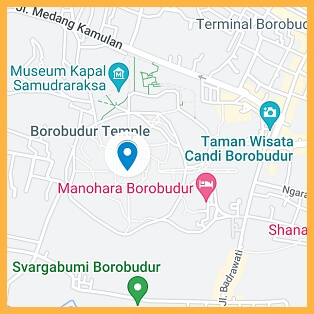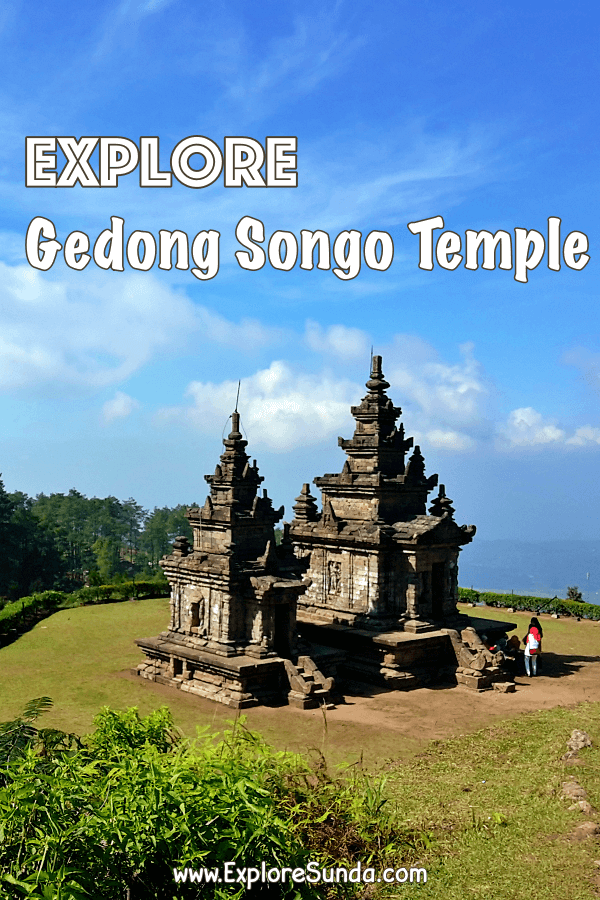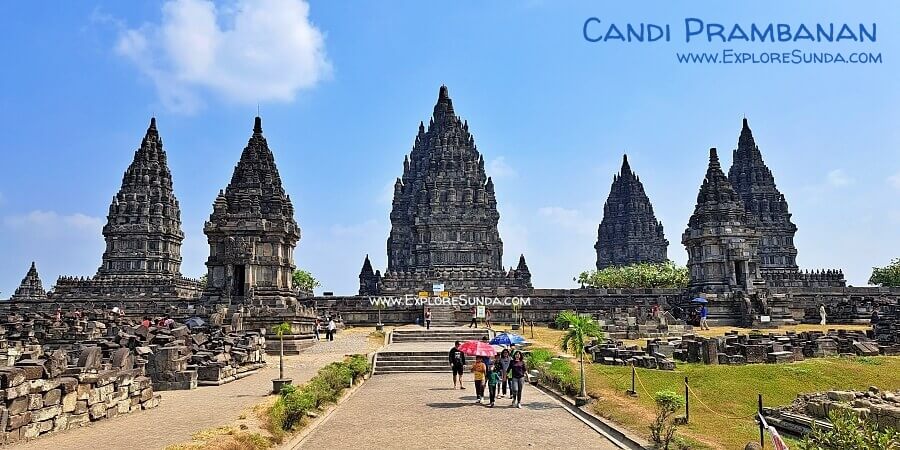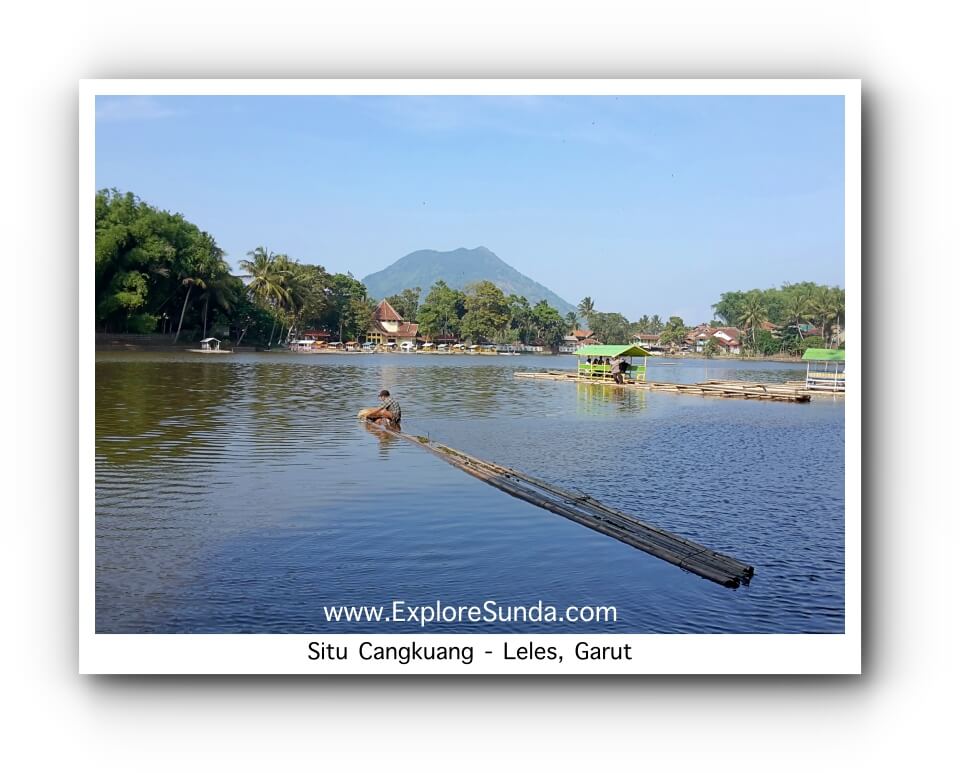- Sunda
- Beyond Sunda
- Borobudur Temple
Candi Borobudur
The Largest Buddhist Temple in The World
Candi Borobudur in Central Java is the world’s largest Buddhist archaeological site, as recorded by the Guinness Book of World Records. In 1991, UNESCO included Candi Borobudur in its list of World Heritage Sites.
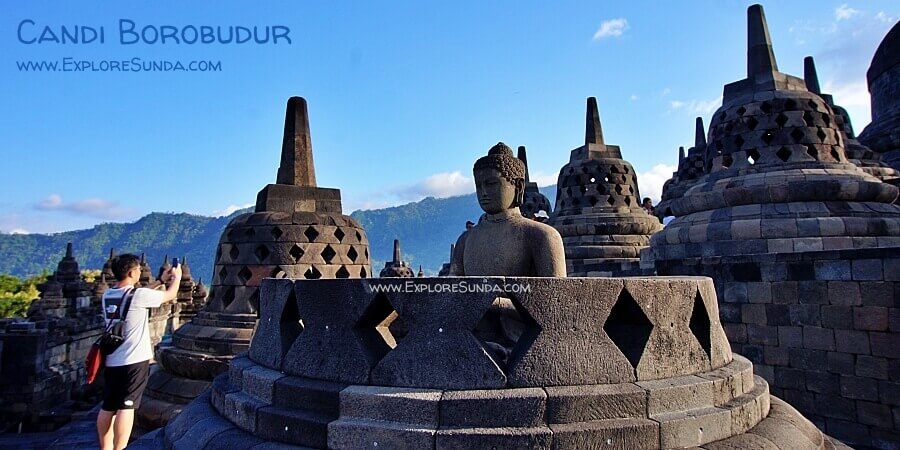 Every day, thousands of tourists are drawn to Candi Borobudur to explore the largest Buddhist temple in the world.
Every day, thousands of tourists are drawn to Candi Borobudur to explore the largest Buddhist temple in the world.Candi is a term in Bahasa Indonesia that refers to ancient shrines for Buddhists and Hindus. Most Candi we know today are made of stones, as those made of bricks could not withstand the weather for centuries and disintegrated. Some Candi are only seen as archaeological sites, while others are still used as places of worship.
What is Candi Borobudur?
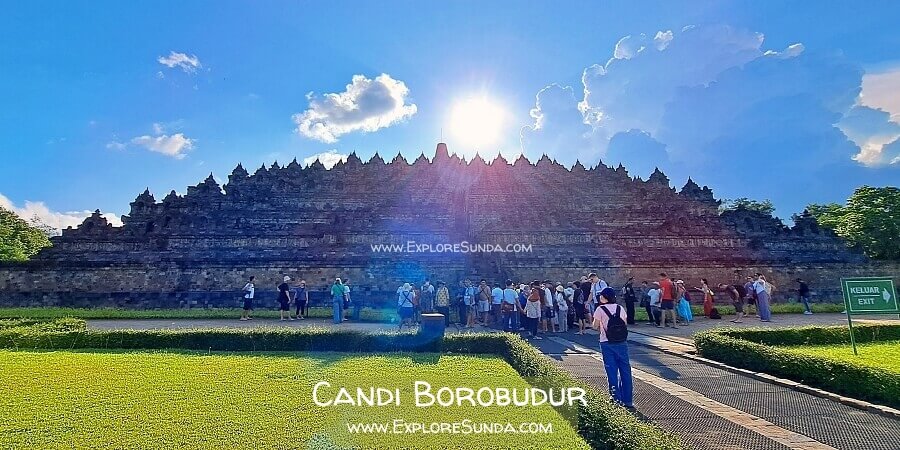 Borobudur Temple, the biggest Buddhist shrine in the world.
Borobudur Temple, the biggest Buddhist shrine in the world.Candi Borobudur is the largest Buddhist shrine in the world, with a base area of 121 meters by 121 meters. It took 55 years to build (from 770 to 825 AD) and was completed during the reign of King Samaratungga from the Sailendra dynasty. The temple is made entirely of andesite stones covering a small hill in the shape of a stepped pyramid. All of those stones were interlocked without using any concrete to bind them together. The majority of its stone walls are adorned with reliefs (wall-mounted sculptures). According to archaeologists, the Borobudur temple was built in the shape of a mandala and was situated in the middle of an ancient lake that dried up a long time ago. Therefore, from an aerial view, the temple appears to be a stone lotus in the center of a pond.
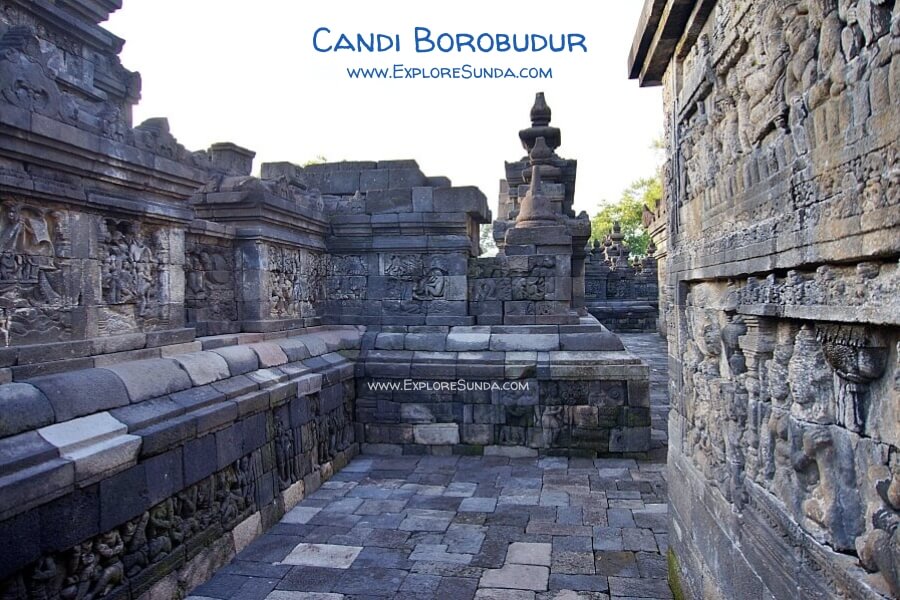 The corridors of Candi Borobudur are adorned with reliefs, and the floor is made of interlocked andesite stones.
The corridors of Candi Borobudur are adorned with reliefs, and the floor is made of interlocked andesite stones.The ten levels of the Borobudur temple are divided into three zones, which represent Buddhist Cosmology. The first six levels are square-shaped with one set of staircases on each side and each level has corridors with reliefs on both sides.
The first zone is Kamadhatu, located at the foot of the temple, representing the world of desire. The reliefs in this zone are based on the Karmawibhangga Sutra, which explains the cause-and-effect law of human behavior. It consists of 160 reliefs, but most of them are hidden below ground. If you are interested, you can visit the Borobudur Museum at the Borobudur Archaeological Park to see the photography of the whole collection.
Moving up, you will reach the zone of Rupadhatu, which represents the world of forms. This zone comprises five square levels with narrative and decorative panels. The narratives of Gandavyuha, Lalitavistara, Jataka, and Awadana are depicted in over 1,300 reliefs. Besides the narrative panels, this zone also has 1,212 decorative panels. In total, these reliefs are stretched over 2.5 km. To read the stories properly, you should start at the east gate on the lowest level of Rupadhatu, walk clockwise until you reach your starting point, and then go up one level for another clockwise reading until you reach the sixth floor.
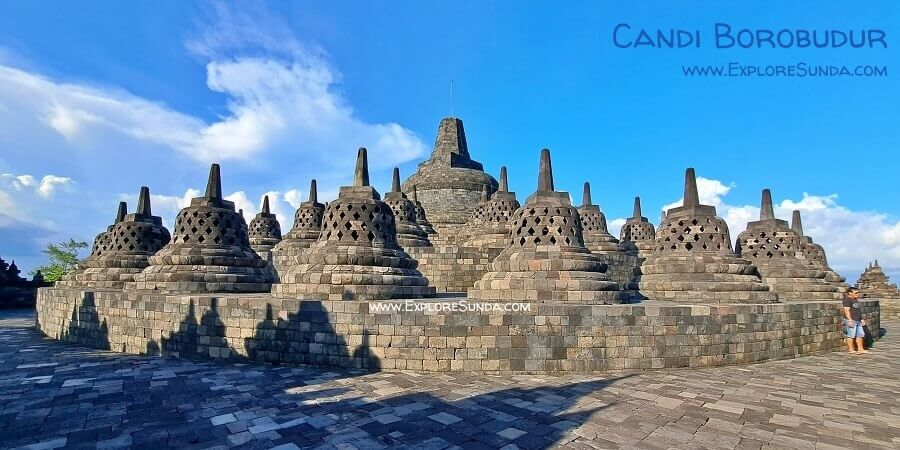 The Arupadhatu zone of Candi Borobudur consists of 72 stupas.
The Arupadhatu zone of Candi Borobudur consists of 72 stupas.The last zone comprises the seventh to tenth levels, known as Arupadhatu, representing the world of formlessness. While the corridors of the other two zones are full of relief, the three terraces of Arupadhatu are circular without any relief, but there are 72 stupas here (a stupa is a dome-bell-shaped structure in a Buddhist shrine). There is a statue of Buddha inside each of these stupas. If you look closely, you can see that the statues represent six different hand positions of Buddha. Two stupas in this zone have not been fully reconstructed yet, where you can see the Buddha and his hand position clearly. While stupas on the seventh and eighth levels have diamond holes, the stupas on the ninth level have square holes, which represent higher enlightenment before reaching the highest enlightenment in the main stupa. The main stupa lies in the middle of the highest terrace. The outer stupa is solid and plain, and the inside is empty. It is only opened during ceremonial rituals on Vesak.
Many more Buddha statues decorated Borobudur temple, 504 Buddha statues in total. Some are intact, but many statues are missing some body parts, thus many of them are headless or armless.
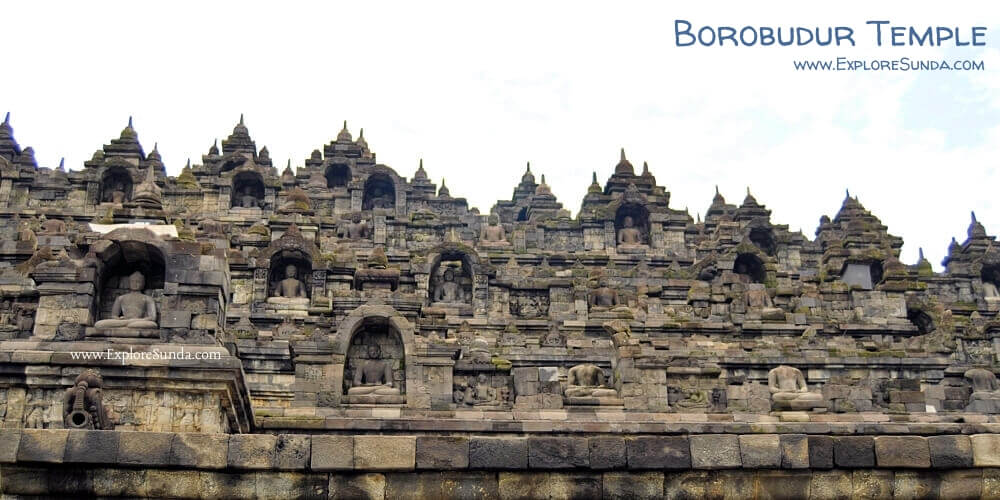 Hundreds of Buddha Statues at Candi Borobudur.
Hundreds of Buddha Statues at Candi Borobudur.Candi Borobudur is in line with two other temples: Candi Pawon (approx. 1.15 km from Borobudur) and Candi Mendut (approx. 3 km from Borobudur).
Every year, there is a big procession during Vesak Day, to commemorate the birth, enlightenment, and death of Buddha Gautama. The procession starts from Candi Mendut to Candi Pawon and culminates at Candi Borobudur.
A Trip to Borobudur Temple
Considering the size and intricate details of Candi Borobudur, how much time do you think you need to properly explore it? In the past, visitors were allowed to spend all day long to admire the relief sculpture by circling the Borobudur temple level by level. However, an uncontrolled number of visitors climbing Borobudur at the same time damaged the temple’s structure. According to archaeologists, the original height of Borobudur was 42 meters, but now it is 35 meters only. Hence, now they control the number of tourists by advanced booking for a one-hour guided tour.
In 2024, there are two types of tickets available to visit Borobudur. The first one is the Temple Structure ticket, which includes a guided tour to climb the temple for one hour. The second option is the Temple Ground ticket, which only allows you to roam the park up to the foot of the temple. You can purchase the tickets either online at the official site ticket.borobudurpark.com or on-site. Please note that since the number of visitors is limited, there is a chance that the tickets will be sold out. There are eight tours available every day from Tuesday to Sunday, with the earliest tour starting at 08.30 AM and the latest one beginning at 03.30 PM. Mondays are reserved for student field trips.
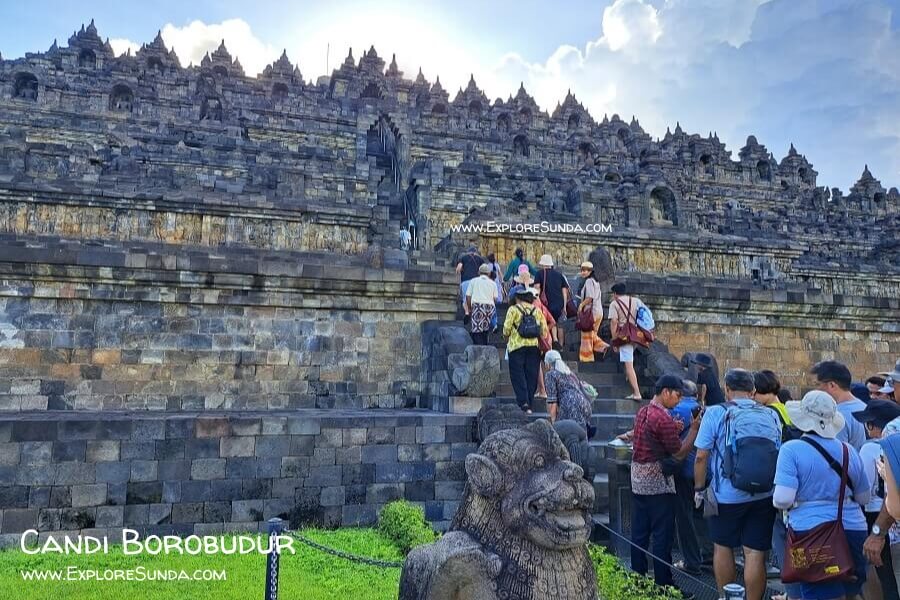 Everyday thousands of tourists explore Borobudur Temple.
Everyday thousands of tourists explore Borobudur Temple.In addition to the limitation of the number of visitors climbing Borobudur en masse, visitors are not allowed to climb the temple wearing their footwear. You will get a pair of Upanat (a pair of sandals made of pandanus leaves with rubber soles) and a bag to carry your footwear. Surprisingly, these Upanat are comfortable :)
When you visit Candi Borobudur, be prepared for a long walk under the scorching sun. The park surrounding the temple is literally massive, as it functions as the buffer zone to absorb vibrations from vehicles and nearby villages. Nowadays the trees in the park have grown big and tall, obstructing the view of Borobudur from afar and making it look more magical.
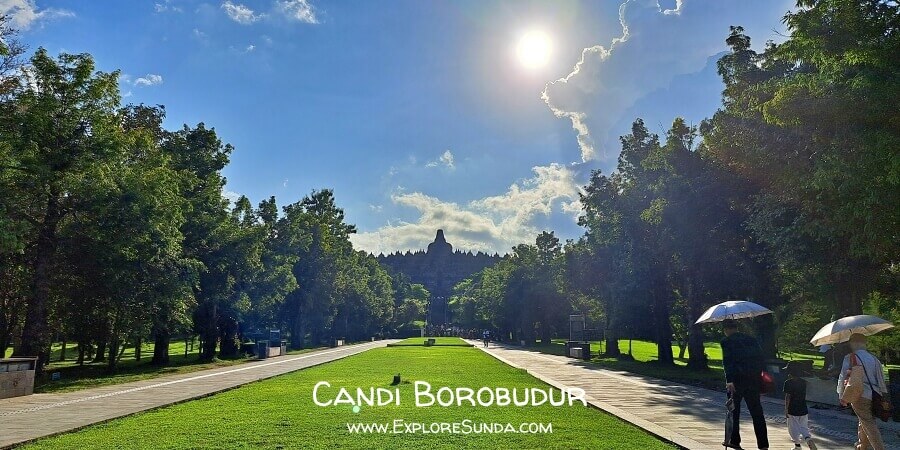 Late afternoon in the massive Borobudur Park with a magical view of the temple in the background.
Late afternoon in the massive Borobudur Park with a magical view of the temple in the background.Visitors are grouped together and assigned a tour leader. It is important to stay with your tour group leader throughout the climb and descent, as they are responsible for ensuring everyone is accounted for. Unfortunately, this means there is little time to explore the temple's magnificent structure in-depth. Our tour leader took us directly to the fourth level of the temple, explained a bit about the relief, structure, and rain drainage system, and in a rush he proceeded to the sixth level, where you can see Menoreh Hill on the south side of the temple. Legend has it that Menoreh Hill was the resting place of Gunadharma, the architect of Borobudur. You will not see a tomb or anything like that, but you use your imagination to visualize the whole hill as the body of Gunadharma lying on his back.
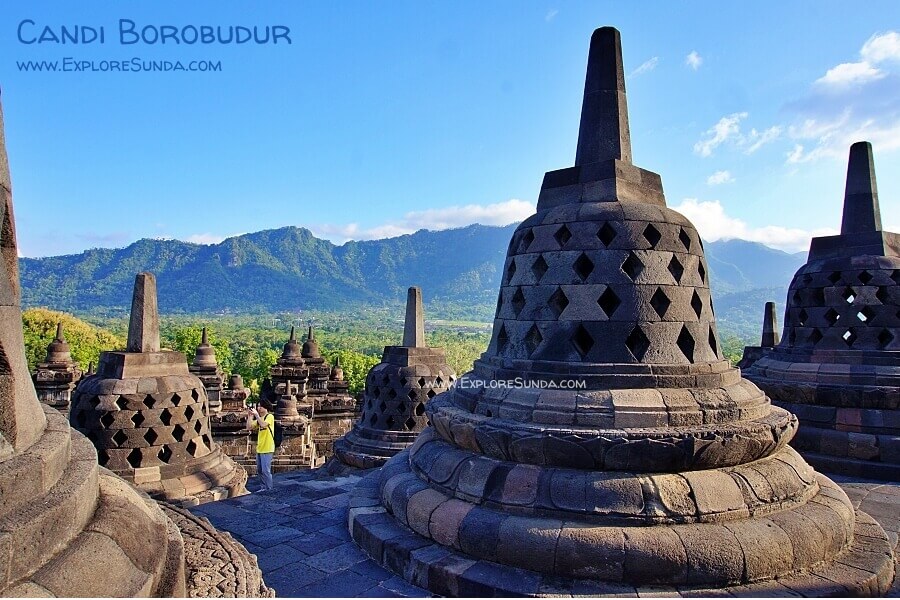 From the top of Borobudur temple, you can see Menoreh Hill, which is believed to be the late Gunadharma, the architect of Candi Borobudur.
From the top of Borobudur temple, you can see Menoreh Hill, which is believed to be the late Gunadharma, the architect of Candi Borobudur.On the sixth level, you get fifteen to twenty minutes of free time to explore Borobudur. You get a chance to take pictures and admire how people in the eighth century built a temple as big as Borobudur without any cement and carved stones with intricate details. Before you know it, your time’s up, you must go down, and have a staff member scan the QR code on your bracelet to check you out of the Borobudur.
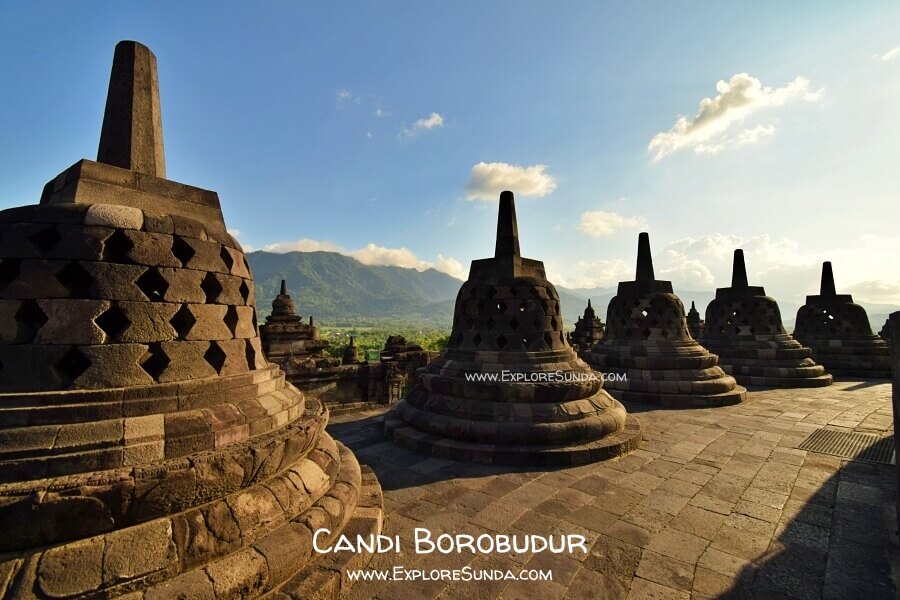 The circular terrace of Borobudur temple with rows of stupas and view of Menoreh Hill.
The circular terrace of Borobudur temple with rows of stupas and view of Menoreh Hill.On your way to exit the temple grounds, there is a small clearing area where you can take a clear picture of Borobudur without any trees blocking the view.
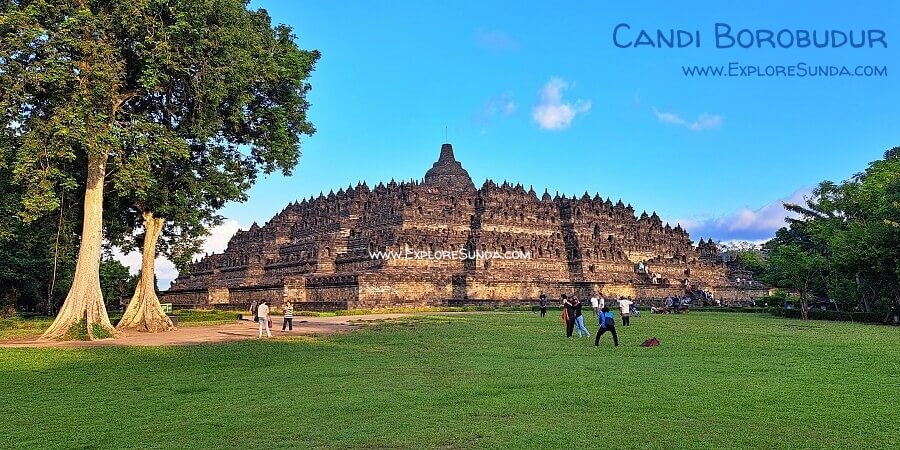 Candi Borobudur with all of its grandeur.
Candi Borobudur with all of its grandeur.Opening Hours:
Tuesday - Sunday, 09.00-17.00
Tickets For Indonesian:
- Temple Ground Ticket:
- > 10 years old: Rp.50,000
- 3-10 years old: Rp.25,000
- Temple Structure Ticket:
- > 10 years old: Rp.120,000
- 3-10 years old: Rp.75,000
Tickets For Foreigners:
- Temple Ground Ticket:
- > 10 years old: Rp.400,000
- 3-10 years old: Rp.240,000
- Temple Structure Ticket:
- > 10 years old: Rp.455,000
- 3-10 years old: Rp.305,000
The distance from the ground temple to the exit gate is approximately five hundred meters. If you are not that keen on walking, you can rent a golf cart or hop on to Tayo (a shuttle car). On the outer side of the park fence, you will find souvenir markets. The vendors can be quite aggressive in selling their merchandise, but going through this market is inevitable because the parking lot is located at the end of it.
 Shopping at Borobudur Temple's souvenir market.
Shopping at Borobudur Temple's souvenir market.Tips:
Since you will walk outdoors a lot, it’s better to come early in the morning or late in the afternoon to avoid the heat.
How To Go To Borobudur Temple
The Borobudur temple complex is situated in Muntilan, Magelang, Central Java. The address is at Jalan Badrawati, Kawasan Candi Borobudur, Borobudur, Kecamatan Borobudur, Kabupaten Magelang, Jawa Tengah. The GPS coordinates are 7°36'28.7"S 110°12'13.4" E (-7.607960, 110.203730).
Although Magelang is the closest city (17 km) to Candi Borobudur, most people prefer to stay in Yogyakarta (40 km) or Solo / Surakarta (85 km), because both Jogja and Solo are the center of tourism and rich in Javanese culture. Plus, there are many flights and train schedules to Jogja and Solo. However, the trend is changing. Today, plenty of good accommodations are available near Borobudur temple.
Recent Articles
-
Roro Jonggrang: A Tale Etched in the Stones of Prambanan Temple
Nov 05, 25 11:52 PM
Unravel the ancient Javanese legend of Roro Jonggrang that bridges myth, devotion, and the grandeur of Prambanan. -
Discover the Vibrant Celebration of Imlek in Indonesia!
Jan 13, 25 03:24 AM
The Chinese New Year of 2576 will be celebrated on January 29, 2025. Discover the special things in this Imlek festival! -
The Site Map of ExploreSunda.com
Nov 26, 24 10:40 PM
A thorough site map to help you browse through the Explore Sunda site.
![Explore Candi Borobudur [BorobudurTemple], the largest Buddhist temple in the world and one of the Seven Wonders of the World | #ExploreSunda #Borobudur Explore Candi Borobudur [BorobudurTemple], the largest Buddhist temple in the world and one of the Seven Wonders of the World | #ExploreSunda #Borobudur](https://www.exploresunda.com/images/borobudur-pinterest.png)
![Explore Candi Borobudur [BorobudurTemple], the largest Buddhist temple in the world. | #ExploreSunda #Borobudur Explore Candi Borobudur [BorobudurTemple], the largest Buddhist temple in the world. | #ExploreSunda #Borobudur](https://www.exploresunda.com/images/candi-borobudur-pinterestC.jpg)
![Explore Candi Borobudur [BorobudurTemple], the largest Buddhist temple in the world and one of the Seven Wonders of the World | #ExploreSunda #Borobudur Explore Candi Borobudur [BorobudurTemple], the largest Buddhist temple in the world and one of the Seven Wonders of the World | #ExploreSunda #Borobudur](https://www.exploresunda.com/images/candi-borobudur-pinterestA.jpg)
![Explore Candi Borobudur [BorobudurTemple], the largest Buddhist temple in the world and one of the Seven Wonders of the World | #ExploreSunda #Borobudur Explore Candi Borobudur [BorobudurTemple], the largest Buddhist temple in the world and one of the Seven Wonders of the World | #ExploreSunda #Borobudur](https://www.exploresunda.com/images/candi-borobudur-pinterestB.jpg)
